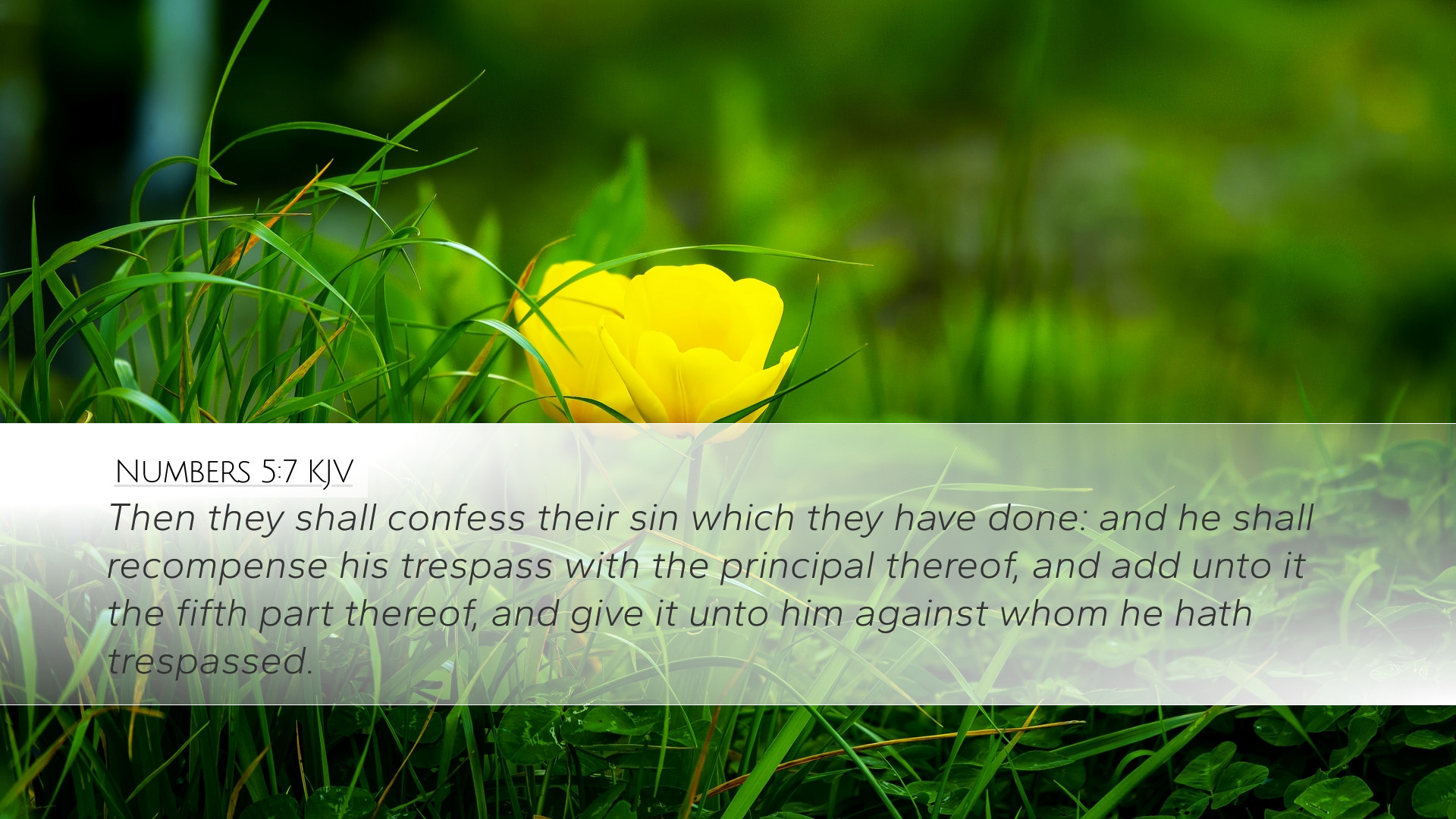Commentary on Numbers 5:7
Bible Verse: "Then they shall confess their sin which they have done: and he shall recompense his trespass with the principle thereof, and add unto it the fifth part thereof, and give it unto him against whom he has trespassed." (Numbers 5:7, KJV)
Introduction
The verse in Numbers 5:7 addresses the critical aspect of confession and restitution within the community of Israel. This command underscores the necessity of acknowledging one's wrongful actions and the imperative of making amends to those wronged. The thoughtfulness of divine law is characterized by an overarching principle of justice and mercy, as articulated in the commentaries from Matthew Henry, Albert Barnes, and Adam Clarke.
Confession of Sin
Matthew Henry emphasizes that this verse illustrates the importance of confession. Confession is not merely an acknowledgment of wrongdoing but a necessary step in the restoration process. In the biblical context, it revealed the attitude of the sinner and set a foundation for reconciliation with both God and man.
Henry states that true confession leads to repentance and is essential in restoring relations damaged by sin. Effective confession must be sincere and fully encompass the actions that harmed others. The confession’s intent should align with the heavenly acknowledgment of sinfulness.
The Necessity of Restitution
Albert Barnes highlights the principle of restitution that runs throughout the Old Testament. He notes that God required the sinner to restore what was lost and to add a penalty of one-fifth, illustrating the seriousness of behavioral consequences. This principle encourages personal accountability.
Barnes elaborates that restitution represents both legal and moral rectitude, emphasizing that God understands the human propensity to forsake honesty. Thus, this requirement promotes a society grounded in integrity, deterring dishonest behaviors. The one-fifth penalty serves as a deterrent and underscores the severity of theft and dishonesty.
Spiritual and Social Implications
Adam Clarke presents an insightful examination of the social ramifications of sin within Israelite society. Clarke states that sin is never an isolated act; it is often communal. When one individual sins, the community is affected. Therefore, the requirement of confession and restitution serves to maintain social harmony and communal integrity.
Clarke also indicates that the fact that restitution is demanded from the trespasser strengthens the moral fabric of the community. It embodies the ideal that anyone who harms another must take proactive steps to rectify both the physical loss and the emotional distress caused by their actions.
Conclusion: The Nature of God’s Justice
The holistic approach represented in Numbers 5:7 culminates in a deeper understanding of God's justice. It affirms that God is not only concerned with the spiritual standing of individuals but also recognizes the significant impact of actions on society. The commentaries by Henry, Barnes, and Clarke collectively reflect that God desires honesty, accountability, and community restoration.
This principle holds true for contemporary Christians, urging leaders, scholars, and lay members alike to embrace both the spiritual and tangible aspects of repentance. Understanding and applying these principles can lead to enriched community relationships, a more profound personal faith, and a general upliftment of communal life.
Reflection Questions
- How does our contemporary understanding of confession and restitution compare to the principles outlined in this verse?
- In what ways can communities of faith incorporate these principles to foster reconciliation and integrity?
- What does this scripture teach us about accountability in our personal and communal lives?


